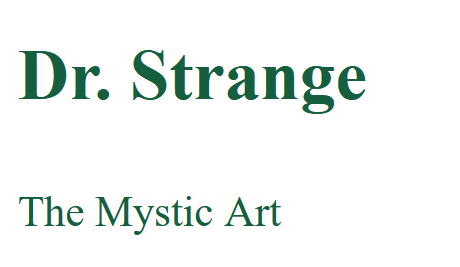Stateful Component
ElementalComponentState
ElementalComponentState is a class that provides a state management capabilities to StatefulElementalComponent. The states are represented as ValueObjects.
Example
import { hasValue, ValueObject } from '@sohailalam2/abu';
import { ElementalComponentState, StateIsNotConsistentException } from '@sohailalam2/elemental-web';
export interface HeroMessage {
name: string;
message: string;
}
export class State extends ElementalComponentState<HeroMessage> {
static defaultState<Type, K extends ValueObject<Type>>(): K {
return State.from({ name: 'unknown', message: 'unknown' }) as K;
}
validate() {
super.validate();
const isConsistent = hasValue(this.value) && hasValue(this.value.name) && hasValue(this.value.message);
if (!isConsistent) {
throw new StateIsNotConsistentException(this.constructor.name);
}
}
}
import { hasValue, ValueObject } from '@sohailalam2/abu';
import { ElementalComponentState, StateIsNotConsistentException } from '@sohailalam2/elemental-web';
export interface HeroMessage {
name: string;
message: string;
}
export class State extends ElementalComponentState<HeroMessage> {
static defaultState<Type, K extends ValueObject<Type>>(): K {
return State.from({ name: 'unknown', message: 'unknown' }) as K;
}
validate() {
super.validate();
const isConsistent = hasValue(this.value) && hasValue(this.value.name) && hasValue(this.value.message);
if (!isConsistent) {
throw new StateIsNotConsistentException(this.constructor.name);
}
}
}
Class Signature
export class ElementalComponentState<T> extends ValueObject<T> {
static defaultState<Type, K extends ValueObject<Type>>(): K {}
static deserializationMapper(): ValueObjectDeserializationMapper | undefined {}
public static deserialize<Type, K extends ValueObject<Type> = ValueObject<Type>>(
value: string | undefined,
mapper = this.deserializationMapper(),
): K {}
}
export class ElementalComponentState<T> extends ValueObject<T> {
static defaultState<Type, K extends ValueObject<Type>>(): K {}
static deserializationMapper(): ValueObjectDeserializationMapper | undefined {}
public static deserialize<Type, K extends ValueObject<Type> = ValueObject<Type>>(
value: string | undefined,
mapper = this.deserializationMapper(),
): K {}
}
👺 Overrides for complex state
It is essential to override the defaultState(), deserializationMapper(), and validate() methods for complex ValueObjects to ensure the state is correctly handled and is consistent.
StatefulElementalComponent
By extending StatefulElementalComponent, your component classes will have access to an internal state object, defined by the type declared in the component definition. Additionally, StatefulElementalComponent extends ElementalComponent, providing all the powerful features and capabilities of ElementalComponent.
The need to override the deserialize() method only arises when the state is a non-primitive, such as a complex value object, which requires additional steps to deserialize correctly. However, it's quite simple, all you need to do is override the deserialize() method of your component class and call the correct deserialize() of the state class that extends ElementalComponentState.
Example
import { Component, ObservedState, StatefulElementalComponent } from '@sohailalam2/elemental-web';
import { HeroMessage, State } from './State';
@Component()
export class Hero extends StatefulElementalComponent<State> {
protected render() {}
protected deserialize(serialized: string | undefined): State {
return State.deserialize<HeroMessage, State>(serialized);
}
}
import { Component, ObservedState, StatefulElementalComponent } from '@sohailalam2/elemental-web';
import { HeroMessage, State } from './State';
@Component()
export class Hero extends StatefulElementalComponent<State> {
protected render() {}
protected deserialize(serialized: string | undefined): State {
return State.deserialize<HeroMessage, State>(serialized);
}
}
StatefulElementalComponentOptions
The constructor offers a configuration option by accepting an optional StatefulElementalComponentOptions object, which builds upon the options provided by ElementalComponentOptions and offers additional options for state management.
| Option | Type | Description |
|---|---|---|
| state | ElementalComponentState<unknown> | StatefulElementalComponent comes equipped with an internal state, defined by the type declared in the component definition. The state can be easily accessed and managed through the this.$state property, making it simple to build dynamic and engaging user interfaces. |
Example
The following example demonstrates a number of interesting concepts:
- State properties are defined as immutable Value Objects with custom validation
- A stateful component should override the deserialization() method to provide correct deserialization support
- The custom element can be registered together with its template and styles
- The template shows
template partswhich can be used to provide theme support - The styles show the usage of
::partpseudo-element. Read more here
Check the Stateful Component code example for more details
